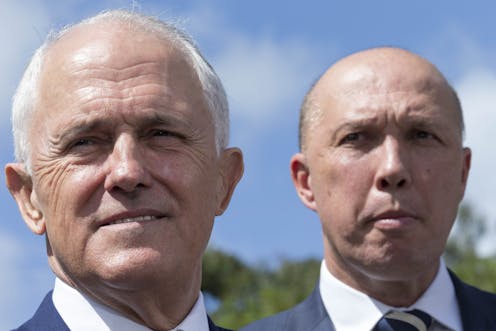Dutton v Turnbull is the latest manifestation of the splintering of the centre-right in Australian politics
- Written by Rob Manwaring, Senior Lecturer, Politics and Public Policy, Flinders University

So, Malcolm Turnbull survives. In part, the trigger for the stand-off between Turnbull and Home Affairs Minister Peter Dutton was Turnbull’s poor handling of energy policy and the flips flops over the NEG.
But much of the commentary on Dutton’s challenge thus far has focused on the issue of leadership.
No prime minister has seen out a full term in office since John Howard won the 2004 election. The vexed and sometimes opaque issue of “leadership” is clearly part of the story of the current restless nature of Australian court politics.
Prime ministers can be popular with the public, but oftentimes fail to land policy achievements (Turnbull, Kevin Rudd). Others can secure policy wins, but lack public rapport (Julia Gillard). Some fail to transition from opposition to government (Tony Abbott). In all these cases, managing the party dynamics proved problematic, at best.
Read more: Your time starts now: how leadership instability and revenge became woven into our political fabric
While leadership is an important part of this story, there are perhaps wider structural problems in Australian politics that are fuelling Turnbull’s travails. The focus on leadership is deflecting attention from another issue: the fraying of centre-right politics.
Splintering on the right
As has been widely documented, the vote for minor parties has been steadily increasing in recent years. In 2007, when Rudd beat Howard, the vote for minor parties and others in the Senate was 19.76%. In the 2013 election, it was 32.09%, and then in 2016, it was a record high of 35.03%.
Even in the House of Representatives, with its plurality electoral system, 13.5% of Australians voted for neither of the major party groupings in the 2016 elections - roughly 3.1 million voters.
What is striking is that, by and large, there is far more diversity on the centre-right spectrum of the ballot these days. For the most part, the Greens tend to swallow up the residual centre-left vote, for those disenchanted with Labor. But for the centre-right, the options are much greater.
On a rough count, of the 10 minor parties to perform well in the 2016 Senate elections, one could be categorised as centre-left (Greens) and one as centrist (NXT). The rest can be plotted along a spectrum from centre-right to right-wing (One Nation, Liberal Democrats, etc). Clearly, some are regionally specific, but it reflects a growing variety of the centre-right.
In recent years, we have seen Bob Katter leave the Coalition to sit as an Independent, and then establish his own party. Lest we forget, Clive Palmer also established his own party, disbanded it, and now promises to re-launch it. Notably, Cory Bernardi, the former lead candidate on the SA Liberal Upper house ticket, left the party in 2017 to establish the Australian Conservatives. Bernardi’s move prompted the Family First to join this new conservative “movement”.
Elsewhere, there has been evidence of disaffection with the Nationals, even if we put aside Barnaby Joyce’s troubled time as leader. Prominent former independents like Tony Windsor and Rob Oakeshott reflected a distancing of those with previous loyalties to the Nationals.
Added to this is the resurgence of Pauline Hanson’s One Nation, which swept up four seats in the Senate at the last election. One Nation also won 15.9% of the vote at the recent Longman by-election, which was also seen as a further catalyst for the leadership challenge to Turnbull.
A more vocal conservative opposition
This crowding of the centre-right is having profound consequences for Australian politics, and not just Turnbull’s troubled time as prime minister.
As we have seen in recent weeks, obscure peripheral politicians are clamouring for air space to outbid each other in offensive claims in their on-going war against “political correctness”. David Leyonhjelm’s baiting of fellow Senator Sarah Hanson-Young to “stop shagging men” reflects the changing and deteriorating parameters of public discourse.
Read more: View from The Hill: Energy policy and Turnbull's leadership plunge into debilitating uncertainty
This competitive atmosphere on the right then helps us better understand the despicable comments made by Senator Fraser Anning. What is more interesting about Anning than his appalling speech, is that he reflects a restlessness and fracturing on the right to find a political “home”, leaving One Nation to join Katter’s Australian Party.
This smorgasbord of the right poses both a strategic and tactical dilemma for the conservative hub in the Liberal Party. For some, the space for conservative politics within the party is limited, so they choose to leave (Bernardi). For those who remain, the conservative wing is a sizeable and troublesome minority, but a minority nonetheless – as Dutton’s leadership numbers attest.
Moreover, even when the conservative faction secures policy wins (such as the dilution or abandonment of energy or climate policy), these do little to satisfy the clamour for a renewed conservative politics.
Howard is often seen as the master in bridging the liberal and conservative wings of the party, yet to some extent, he never faced the wider structural problems that confront Turnbull. There have always been prominent and outspoken right-wing politicians in Australia, but the growth and fracturing is proving problematic and not just for Turnbull.
Authors: Rob Manwaring, Senior Lecturer, Politics and Public Policy, Flinders University





